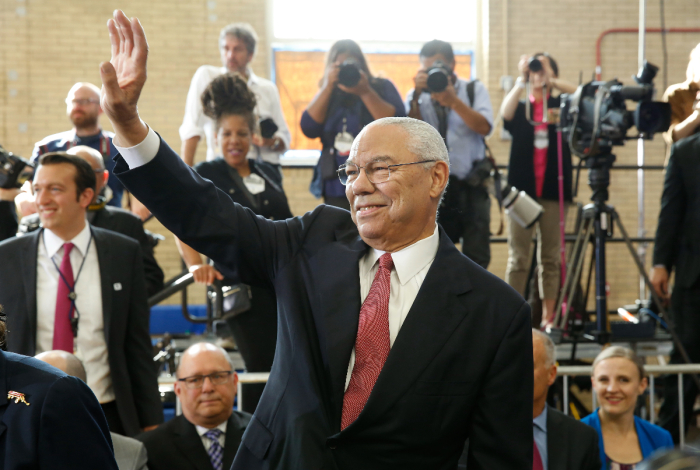Colin Powell dies from COVID-19 complications amid cancer battle; he was fully vaccinated

Gen. Colin L. Powell, the first African American to serve as U.S. secretary of state and chairman of the Joint Chiefs of Staff, died Monday morning from COVID-19 complications despite being fully vaccinated his family announced. He was 84.
Former U.S. Secretary of State and former Chairman of the Joint Chiefs of Staff, Gen. Colin L. Powell, who was the first African American to hold both offices, died Monday morning from COVID-19 complications despite being fully vaccinated, his family announced. He was 84.
"He was fully vaccinated. We want to thank the medical staff at Walter Reed National Medical Center for their caring treatment. We have lost a remarkable and loving husband, father, grandfather and a great American," the Powell family said in a statement.
Powell also suffered from multiple myeloma, a blood cancer that makes it difficult to fight infections even if a person is vaccinated, according to The New York Times.
As news of his passing spread Monday, many praised Powell for the life he lived, even if they disagreed politically.
"Today, the nation lost a man of undaunted courage and a champion of character," Sen. Mitt Romney, R-Utah, tweeted. "A statesman & trailblazer, devoted to America and the cause of liberty, Colin Powell's legacy of service & honor will long inspire. Ann & I offer our love & sincere condolences to Alma and his family."
Donna Brazile, the former chair of the Democratic National Committee and current King Lecture Chair at Howard University in Washington, D.C., called Powell a "good decent man."
"He made a way out of no way for so many to serve," Brazile tweeted. "I'll never forget his kind words about my Dad who served in the military. May his soul rest in power. To all who knew him and worked along his side, my sympathy to you and his family."
Alexander Vindman, the former director for European Affairs at the U.S. National Security Council and retired lieutenant colonel in the U.S. Army, said Powell was the "epitome of a soldier-statesman."
"Agree with him or not, he was a patriot committed to public service and doing his very best to advance U.S. interests," Vindman stated on Twitter. "He left an indelible mark on the U.S. Military and this nation. May his memory be a blessing."
Powell was born April 5, 1937, in Harlem, New York, to Jamaican immigrants. He grew up in the South Bronx, then attended school at the City College of New York, participating in the Reserve Officers' Training Corps.
Upon graduation in 1958, Powell was commissioned as a second lieutenant in the U.S. Army. He met and married his wife Alma while stationed at Fort Devens, Massachusetts, in 1962. The union produced three children — daughters Linda and Annemarie and son Michael.
A year after Powell got married, he was sent as one of 16,000 advisers to South Vietnam by President John Kennedy. He was wounded by a punji-stick booby trap and received a Purple Heart and a Bronze Star for his service.
Powell took over the Army Forces Command and was made chairman of the Joint Chiefs of Staff by President George H. W. Bush in 1989, becoming the first African American to rise to that position. He would continue as chairman of the Joint Chiefs in the first few months of the Clinton administration.
In 1993, Powell retired from the Army. In a 1994 Howard University commencement address, Powell urged graduates to "never lose faith in America." Powell was raised in the Episcopal Church.
"Above all, never lose faith in America. Its faults are yours to fix, not to curse. America is a family: There may be differences and disputes within the family, but we must not allow the family to be broken into warring factions," he said in the speech. "From the diversity of our people, let us draw strength and not seek weakness. Believe in America with all your heart and soul, with all of your mind. Remember, that it remains the 'last, best hope of Earth.' You are its inheritors and its future is today placed in your hands."
In 1995, Powell published his autobiography, My American Journey, highlighting aspects of his personal life and lessons learned from his service in the military.
He also served as chairman of America's Promise, a nonprofit dedicated to building character and competence in young people. At the time of his death, he and his wife served as co-chairs of the organization.
Powell was appointed by President George W. Bush in 2001 as secretary of state. At the time, his appointment as secretary of state was the highest rank in civilian government held by an African American. While serving in that position, Powell faced heavy criticism for his role in building the case for the invasion of Iraq in 2003.
Since his retirement in 2005, Powell remained active politically, openly criticizing different administrations over the years.





























